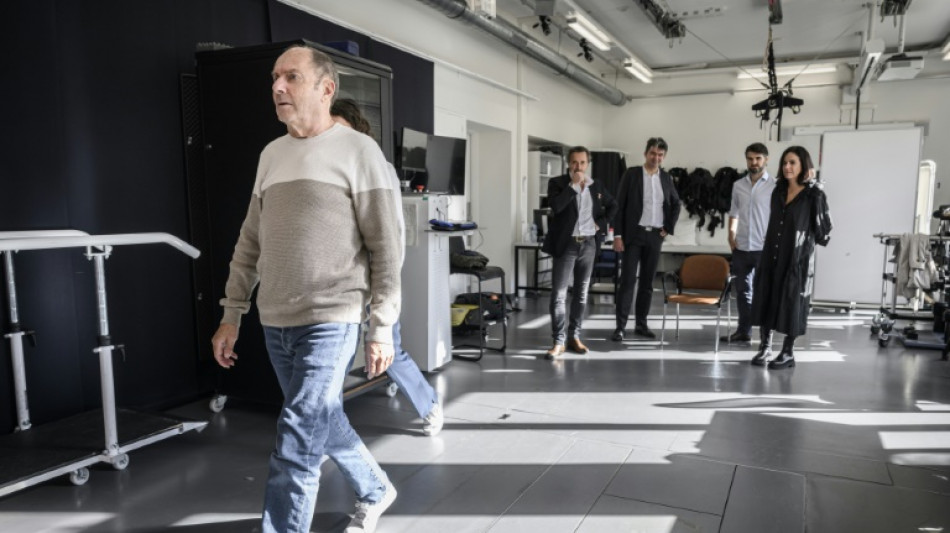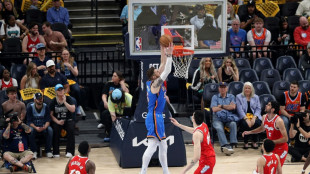
-
 'Legendary' Eubank Jr beats Benn in grudge bout
'Legendary' Eubank Jr beats Benn in grudge bout
-
Thunder sweep past Grizzlies into NBA playoffs 2nd round, Cavs on brink

-
 South Korea's Ryu and Japan's Saigo share LPGA Chevron lead
South Korea's Ryu and Japan's Saigo share LPGA Chevron lead
-
Canada leaders make closing pitches in campaign upended by Trump

-
 De Bruyne's Man City exit 'so difficult' for Guardiola
De Bruyne's Man City exit 'so difficult' for Guardiola
-
'No regrets' for Amorim over Man Utd move

-
 Lyon and Strasbourg win to close in on Europe, Montpellier relegated from Ligue 1
Lyon and Strasbourg win to close in on Europe, Montpellier relegated from Ligue 1
-
Toulouse thrash Castres as Top 14 pursuers stumble

-
 Djokovic crashes to nervous Arnaldi in Madrid opener, Swiatek advances
Djokovic crashes to nervous Arnaldi in Madrid opener, Swiatek advances
-
Olympic champs Russell, Davis-Woodhall win at Drake Relays

-
 Browns end Sanders long draft slide
Browns end Sanders long draft slide
-
Cavs crush Heat, on brink of NBA playoff sweep

-
 Fire rages after major blast at Iran port kills 8, injures hundreds
Fire rages after major blast at Iran port kills 8, injures hundreds
-
Kiwi Beamish wins Penn Relays 1,500m crown with late kick

-
 Mbappe on Real Madrid bench for Clasico Copa del Rey final
Mbappe on Real Madrid bench for Clasico Copa del Rey final
-
England survive France fightback to seal Women's 6 Nations slam

-
 Palace sweep past Villa to reach FA Cup final
Palace sweep past Villa to reach FA Cup final
-
CAF appoint Moroccan Lekjaa first vice-president

-
 Major blast at Iran port kills 5, injures hundreds
Major blast at Iran port kills 5, injures hundreds
-
Rodgers vows to stay with Celtic after fourth successive Scottish title

-
 Ipswich relegated as Newcastle, Chelsea boost top five bids
Ipswich relegated as Newcastle, Chelsea boost top five bids
-
Canada leaders make final pitches in campaign upended by Trump

-
 Mullins -- Ireland's national training treasure
Mullins -- Ireland's national training treasure
-
US, Iran say progress in 'positive' nuclear talks

-
 Mullins emulates O'Brien with second successive trainer's title
Mullins emulates O'Brien with second successive trainer's title
-
Ipswich relegated after one season in Premier League

-
 Just Stop Oil activist group holds final march
Just Stop Oil activist group holds final march
-
Djokovic crashes to nervous Arnaldi in Madrid opener

-
 Syria's Kurds demand 'democratic decentralised' Syria
Syria's Kurds demand 'democratic decentralised' Syria
-
Leverkusen win to delay Bayern and Kane's title party

-
 Buenos Aires farewells native pontiff with tears and calls to action
Buenos Aires farewells native pontiff with tears and calls to action
-
Turkey's opposition says Erdogan's canal plan behind latest arrests

-
 Maresca hails 'nasty' Chelsea as top five bid stays alive
Maresca hails 'nasty' Chelsea as top five bid stays alive
-
Trump raises Putin doubts after Zelensky talks at pope's funeral

-
 Major blast at Iran port kills 4, injures hundreds
Major blast at Iran port kills 4, injures hundreds
-
Napoleon's sword to be sold at auction in Paris

-
 Iran, US discuss nuclear deal in third round of talks
Iran, US discuss nuclear deal in third round of talks
-
Buenos Aires farewells native pontiff with call to action

-
 Warholm sets hurdles world record at Diamond League, Holloway shocked
Warholm sets hurdles world record at Diamond League, Holloway shocked
-
US students 'race' sperm in reproductive health stunt

-
 Wikileaks founder Assange joins crowds for pope funeral
Wikileaks founder Assange joins crowds for pope funeral
-
Leader Marc Marquez claims Spanish MotoGP sprint victory

-
 Celtic win fourth successive Scottish Premiership title
Celtic win fourth successive Scottish Premiership title
-
Jackson ends drought as Chelsea boost top five push

-
 Warholm sets 300m hurdles world record in Diamond League opener
Warholm sets 300m hurdles world record in Diamond League opener
-
Major blast at south Iran port kills 4, injures hundreds

-
 Russia says retook Kursk from Ukraine with North Korean help
Russia says retook Kursk from Ukraine with North Korean help
-
Francis laid to rest as 400,000 mourn pope 'with an open heart'

-
 Trump, Zelensky meet on sidelines of pope's funeral
Trump, Zelensky meet on sidelines of pope's funeral
-
'Shared loss': Filipino Catholics bid Pope Francis farewell


Spinal implant allows Parkinson's patient to walk again
A man with advanced Parkinson's disease is now able to walk almost normally again thanks to electrodes implanted in his spinal cord, researchers said on Monday.
The medical first was achieved by Swiss researchers who had previously pioneered similar breakthroughs to help paraplegic people walk again.
"This could be a game-changing technology to help restore movement in people with advanced Parkinson's," said David Dexter, research director at Parkinson's UK, emphasising that the procedure is invasive and more research was needed.
Marc, the 62-year-old patient who lives in France, has suffered from the debilitating brain disorder for about 30 years.
Like more than 90 percent of people with advanced Parkinson's, Marc has had great difficulty walking.
What are known as "freezing" episodes -- during which patients are temporarily unable to move, putting them at risk of falling -- are particularly "awful", Marc told AFP.
"If you have an obstacle or if someone passes in front of you unexpectedly, you start to 'freeze' and you fall," said Marc, who asked not to reveal his last name.
Much remains unknown about Parkinson's disease, making treatment difficult. But the symptoms can seriously affect the lives of patients, sometimes confining them to bed or a wheelchair.
When the opportunity arose to undergo surgery in Switzerland, Marc leapt at the chance.
- 'I can go do whatever I want' -
"Now I can walk from one point to another without worrying about how I'm going to get there," he said.
"I can go for a walk, go out shopping by myself -- I can go do whatever I want."
The Swiss team, led by surgeon Jocelyne Bloch and neuroscientist Gregoire Courtine, implanted a complex system of electrodes called a "neuroprosthesis" at crucial points along Marc's spinal cord.
The pair had previously introduced the use of spinal cord implants to enable paraplegic patients to walk again.
The latest research, published in the journal Nature Medicine, works roughly along the same principle.
For Marc and other Parkinson's patients, communication between the brain and the spinal cord has been impaired by the progressive disappearance of neurons which generate the neurotransmitter dopamine.
Therefore, the neuroprosthesis has to not only send electrical stimulation to prompt walking, but also assume the role of the brain by properly timing the stimulation, so the resulting movements correspond to the patient's wishes.
"The idea is that we are going to measure residual movements -- so, the intention to walk -- with small sensors which are located in the legs," Courtine told AFP.
"Thanks to this, we know if the person wants to oscillate or stop, and we can adjust the stimulation accordingly," said Courtine, a researcher at the Swiss Federal Institute of Technology Lausanne.
- 'Major potential advance' -
The neuroprosthesis was first tested on primates, then implanted in Marc, who has used it for roughly eight hours a day over nearly two years.
Marc said he can now walk much more easily -- he is even planning a trip to Brazil -- but emphasised that it still requires concentration, particularly when climbing up stairs.
The Swiss team has expanded their experiment to a group of six Parkinson's patients, aiming to know how it could help others, given the disease affects people in different ways.
Treatment using the invasive implant could be quite expensive, potentially limiting how many patients would have access.
Bloch and Courtine have launched a startup called Onward looking at future marketing.
But even reaching this point represents "a major potential advance," Dexter said.
Y.Kobayashi--AMWN



